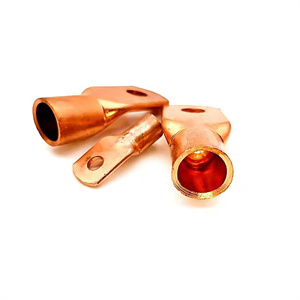Copper battery cable lugs battery cable terminal connectors
There are various materials for terminal connectors, each with its unique characteristics and applicable scenarios. Here are some common materials:
1. Metal: Metal materials such as copper, aluminum, etc. are the main materials used to make terminal connectors. They have robustness and good conductivity, making them suitable for various harsh working environments. Copper terminal connectors are highly favored due to their excellent conductivity, long service life, and ability to resist certain corrosion. Aluminum terminal connectors have cost advantages and also have good conductivity and corrosion resistance.
2. Copper alloys: such as thin-walled copper pipes, copper nickel, and copper oxide. These materials not only have good conductivity and welding performance, but are also suitable for high temperature, high pressure, and high frequency electronic devices.
3. Engineering plastics: such as nylon, polyester, and polypropylene. These plastic materials perform excellently in low pressure, low temperature, and general electronic devices due to their excellent mechanical properties, corrosion resistance, and insulation properties.
4. Stainless steel: Stainless steel terminal connectors have the characteristics of corrosion resistance, good toughness, and high strength, but their processing difficulty and cost are relatively high.
In addition, there are tin terminal connectors that perform well in specific applications such as automotive parts and electronic components due to their excellent oxidation resistance, corrosion resistance, and high temperature resistance.
Copper Battery Cable Lugs has the following features and advantages:
Good conductivity: copper has excellent conductivity, which can ensure the efficient transmission of current between the battery and the cable and reduce energy loss.
Corrosion resistance: good resistance to oxidation and corrosion, stable performance under various environmental conditions, and extended service life.
Good thermal conductivity: help to dissipate the heat generated during the operation of the battery, reduce the risk of overheating, and improve the safety and stability of the battery system.
High-strength connection: it can provide firm and reliable connection, ensure close connection between cable and battery pole, and not easy to loosen.
In actual application:
For example, in the battery system of the vehicle, the copper battery cable terminal can ensure the stable supply of power and support the normal start of the vehicle and the operation of electronic equipment. In industrial energy storage system, they can provide safe and reliable connection for large battery pack.
